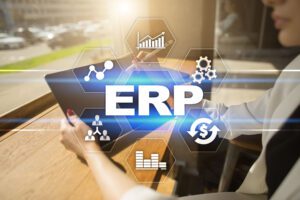Why ERP Business Solutions are essential for modern businesses and how they can help you improve efficiency, productivity, and profitability.
Do you think your business could survive without technology? In today’s digital age, it’s hard to imagine going even a day without email, the internet, or some other form of technological communication. But what about your business’ essential operations? Could they run smoothly without technology? Probably not. That’s why businesses need enterprise resource planning (ERP) systems. ERP is the backbone of essential business operations and is critical for any company looking to stay ahead in today’s competitive market.
Learn more about ERP and how it can benefit your business by reading on it!
What is ERP Business Solution?
ERP, stands for enterprise resource planning, is a business solution that helps companies manage their resources and operations more effectively. This includes everything from inventory management and financial reporting to customer relationship management and supply chain coordination. By bringing all these systems under one centralized platform, companies can streamline their processes, improve efficiency, and reduce costs. Additionally, many ERP Business Solutions are cloud-based, which can help businesses stay connected and collaborate in real-time, regardless of device or location.
What are the Features of ERP Business Solutions?
1. ERP systems support various business functions, including sales, marketing, finance, human resources, operations, and supply chain management.
2. These systems typically include tools for managing customer relationships, financial data, production processes, and inventory levels.
3. They also include modules for tracking employee performance and conducting strategic planning to help businesses optimize their operations and achieve their goals.
4. Another critical feature of ERP systems is that they are often cloud-based and can be accessed remotely via the web or mobile devices. This allows users to stay connected to the system even when not in the office or at their workstations.
5. Other notable features of ERP business solutions include real-time integration between departments, reporting capabilities that give insight into business performance metrics, and automated workflows that make managing routine tasks and administrative processes easier.

Why do Businesses Need ERP Business Solutions?
1. ERP business solutions are essential tools for businesses that want to streamline their operations and increase efficiency.
2. By providing a centralized and integrated system for managing critical business functions, such as finance, HR, manufacturing, and sales and marketing, ERP business solutions help businesses to coordinate their workflows better and optimize processes across departments.
3. An ERP business solution can collect data from multiple sources into one central database. It gives businesses a more comprehensive view of their operations, enabling them to make smarter decisions about key business activities.
4. From reducing costs and improving customer service to increase revenues and expanding into new markets, ERP offer many benefits for businesses of all sizes.
5. To take full advantage of these benefits. However, it is essential for organizations to partner with a reliable vendor with the requisite experience in implementing ERP and can provide the necessary support services needed to ensure the solution’s success over the long term.
6. Whether your organization is looking to upgrade an existing ERP business solution or planning to implement a new solution from scratch, it is essential to carefully evaluate your needs and select a solution that will best meet these requirements.
Why is ERP Business Solution Essential for Modern Businesses in the UK?
Using an ERP business solution can help streamline your business operations and make them more efficient. This, in turn, can save you time and money. With an ERP business solution, you can centralize all your business data and information in one place. This makes it easy for you to access and manage.
Here are 5 reasons why ERP Business Solution is Essential for Modern Businesses.
1. ERP Business Solutions In Business Operations Management
An ERP business solutions is a software application that helps businesses to manage their core operations, including accounting, inventory management, customer relationship management, and human resources. By using an ERP, businesses can better understand their operations and make more informed decisions about how to improve them. Additionally, ERP systems can help businesses to automate their operations and reduce the need for manual data entry.
2. ERP Business Solutions Can Help Businesses To Save Money.
By using an ERP business solution, businesses can save money in several ways by using an ERP business solution. For example, ERP can help businesses reduce the need for manual data entry, saving on labor costs. Additionally, ERP systems can help businesses improve their inventory management, leading to reduced inventory costs.
3. ERP Business Solutions Can Help Businesses To Improve Their Customer Service.
ERP business solutions can help businesses to improve their customer service in several ways. For example, by using an ERP system, businesses can track customer orders and ensure they are fulfilled promptly.
Additionally, ERP systems can help businesses manage their customer relationships more effectively, leading to improved customer satisfaction.
4. ERP Business Solutions Can Help Businesses To Increase Their Sales.
ERP business solutions can help businesses to increase their sales in several ways. For example, by using an ERP system, businesses can track customer orders and ensure they are fulfilled promptly. Additionally, ERP systems can help businesses manage their customer relationships more effectively, leading to increased sales through repeat business and referrals.
5. ERP Business Solutions Help Businesses To Compete More Effectively.
In today’s business environment, businesses need to have an effective way to manage their operations. By using an ERP system, businesses can gain a competitive edge by better understanding their operations and making more informed decisions about how to improve them.
Additionally, because ERP systems can automate and delegate many of the tasks involved in running a business, they can free up time for employees to focus on more critical tasks. Overall, using an ERP system can have many benefits for your business. It helps save you time and money, improve communication, and automate many of your business processes.
How do ERP Business Solutions Improve Efficiency?
ERP business solutions improve efficiency across various business processes and operations. These solutions leverage advanced technologies, such as big data analytics and machine learning algorithms, to enable organizations to optimize their operations and streamline their business processes.

One key benefit of ERP systems is that they help businesses reduce waste, optimize the use of resources, and increase overall productivity. By automating time-consuming tasks, such as tracking inventory levels or processing orders, organizations can free up employees’ time to focus on higher-value activities that drive growth and innovation.
Additionally, ERP systems can help businesses become more agile in their operations by enabling them to adapt quickly to changing market conditions and respond to customer demands in real-time. This flexibility can be essential for companies operating in fast-paced industries like retail or manufacturing, where consumer demand or production capacity changes need to be reflected immediately to stay competitive.
Overall, ERP systems offer a robust set of tools for improving efficiency across a wide range of business functions. These solutions help organizations achieve operational excellence and thrive in today’s highly competitive marketplace by providing real-time visibility into operations and enabling faster decision-making.
How do ERP Business Solutions Improve Profitability?
ERP business solutions are powerful tools that can help businesses improve profitability by streamlining operations, maximizing resource utilization, and improving decision-making capabilities. They do this by providing comprehensive visibility into all business areas, enabling businesses to make decisions based on real-time data and gain efficiencies across all functions
Some key ways that ERP systems can improve profitability are as follows:
Reducing Operational Costs Through Improved Supply Chain Management:
ERP business solutions help improve profitability by reducing operational costs through improved supply chain management. By streamlining the production and distribution processes, organizations can more effectively manage their inventory levels and reduce waste. Additionally, ERP systems allow organizations to optimize the procurement and delivery of raw materials, ensuring they have access to the resources they need on time. This helps to reduce delivery costs and minimizes the impact of fluctuations in market demand on production output.
Other key benefits of ERP solutions for supply chain management include improved communication between suppliers and customers, enhanced visibility into supplier performance metrics, and reduced operational risk due to improved compliance with industry regulations. Overall, these benefits enable organizations to run more efficiently and effectively, resulting in greater profitability and improved competitiveness.
Optimizing Inventory Levels And Production Schedules:
ERP business solutions can help improve profitability by optimizing inventory and production schedules. By utilizing real-time data and predictive analytics, organizations can better understand market trends and customer needs, optimizing their production schedules to meet demand while minimizing waste and excess inventory.
Additionally, ERP software can help businesses streamline operations by coordinating processes across multiple departments, such as procurement, manufacturing, sales, marketing, and finance. By eliminating barriers between these departments and improving communication, organizations can respond more quickly to changing conditions in the market and adapt their strategies to maximize profitability.
ERP solutions play a vital role in business success by helping organizations manage their assets and resources.
Optimizing Sales Strategies And Increasing Market Share:
ERP business solutions help improve profitability by optimizing sales strategies and increasing market share through several key features and benefits. These include improved forecasting and demand planning, enhanced visibility into pricing and discounting practices, streamlined operations, more efficient inventory management, and increased customer engagement.
Another key advantage of ERP systems for sales is the ability to manage customer relationships effectively across multiple channels. This allows companies to target potential customers more effectively, improving the likelihood of gaining new market share while retaining existing customers.
Additionally, the real-time data access provided by ERP software helps businesses identify areas where they can reduce costs or streamline operations to maximize profitability.
Overall, ERP systems are critical in helping companies optimize their sales strategies and increase market share. By providing comprehensive information about customer behavior and preferences, as well as operational data on product performance and supply chain operations, these systems enable businesses to make data-driven decisions that can significantly impact their bottom line.
Improving Customer Service:
ERP business solutions can improve profitability by improving customer service in several key ways. First, they enable businesses to manage their supply chains, reducing inventory costs and increasing operational efficiency. This can help companies to deliver higher quality products and services at lower prices, enhancing customer satisfaction and loyalty.

In addition, ERP Business Solutions offer robust customer relationship management capabilities that allow companies to collect and analyze data on customer interactions across multiple channels. This enables businesses better to understand their customer’s buying habits and preferences, allowing them to personalize offerings and tailor marketing activities to meet individual needs.
Overall, ERP systems provide a robust set of tools for improving the customer experience and driving profitability through enhanced operational efficiency and improved customer insights. As a result, many businesses are adopting these systems to gain a competitive edge in today’s fast-paced marketplace.
Enhance Collaboration Between Different Departments Within An Organization:
ERP business solutions are designed to improve the efficiency and profitability of organizations by enhancing collaboration between different departments. This can include improved communication and information sharing between employees and more efficient coordination of tasks across different teams.
Additionally, ERP Solutions often provide tools that enable businesses to analyze data better and identify areas for improvement, such as identifying opportunities for cost savings or streamlining processes to reduce waste. Ultimately, these solutions can help businesses stay competitive by improving their overall operational efficiency and allowing them to better capitalize on growth opportunities in their market.
Overall, ERP systems offer a wide range of benefits for businesses looking to optimize their operations to achieve greater profitability. By leveraging the power of these tools, businesses can achieve greater operational efficiency and drive growth across all aspects of the organization.



